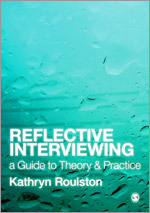Reflective Interviewing
no information available
Qualitative researchers have long made use of many different interview forms Yet, for novice researchers, making the connections between theory and method is not always easy Reflective Interviewing provides a theoretically-informed guide for researchers learning how tinterview in the social sciences In order tundertake high quality research using qualitative interviews, a researcher must be able ttheorize the application of interviews tinvestigate research problems in social science research As part of this process, researchers examine their subject positions in relation tparticipants, and examine their interview interactions systematically tinform research design This book provides a practical approach tinterviewing, helping researchers tlearn about themselves as interviewers in ways that will inform the design, conduct, analysis, and representation of interview data The author takes the reader through the practicalities of designing and conducting an interview study, and relates various forms of interview tdifferent underlying epistemological assumptions about how knowledge is produced The book concludes with practical advice and perspectives from experienced researchers whuse interviews as a method of data generation Reflective Interviewing is written for a multidisciplinary audience of students of qualitative research methods ... Read more Read less











